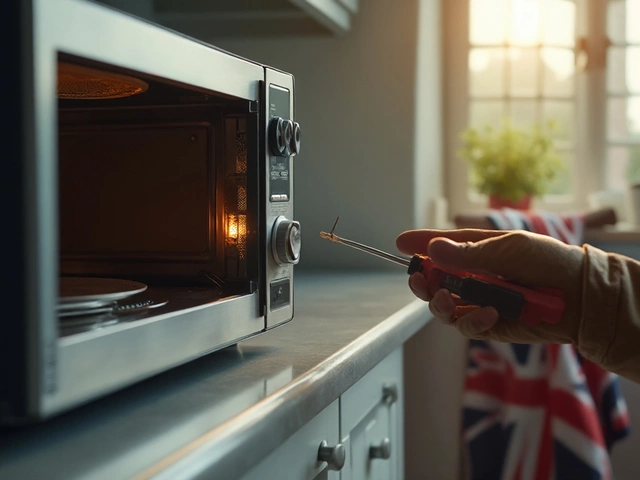If your kitchen smells like yesterday’s dinner, it’s probably time to replace the extractor fan. A good fan pulls steam, smoke, and odors out of the room, keeping things fresh and safe. The good news? Swapping it out is a job most homeowners can do in an afternoon with just a few tools.
Gather these basics so the job runs smoothly:
Turn off the power at the breaker before you touch any wires – safety first.
1. Remove the old fan. Unscrew the front grill, then detach the fan housing from the cabinet. Most units are held by a couple of screws and a simple mounting bracket.
2. Disconnect the wiring. You’ll see a short cord with three wires – live, neutral, and earth. Loosen the wire nuts, separate the wires, and cap them with electrical tape.
3. Take out the old motor. Lift the motor assembly out of the vent pipe. If the pipe is glued, gently twist to loosen it. Keep the old fan nearby so you can compare sizes.
4. Prepare the new fan. Match the new fan’s mounting holes with the cabinet. Some models come with a universal bracket; attach it if needed.
5. Connect the new wiring. Match the live (brown), neutral (blue), and earth (green/yellow) wires and secure them with fresh wire nuts. Double‑check that the connections are tight.
6. Install the fan. Slide the new motor into the vent pipe, align the mounting bracket, and screw everything back into place. Make sure the fan sits flush against the cabinet to avoid rattles.
7. Test it. Turn the breaker back on and switch the fan on. You should hear a steady hum and feel airflow through the vent. If it’s quiet or doesn’t spin, double‑check the wiring and the motor’s orientation.
Cleaning the fan’s blades and the vent pipe every few months will keep it running efficiently.
If at any point the wiring looks damaged, the vent pipe is corroded, or the fan doesn’t match the old size, it’s wise to call an appliance repair professional. A qualified technician can handle complex wiring, ensure the fan meets local building codes, and avoid costly mistakes.
Replacing an extractor fan isn’t rocket science, but it does need a bit of patience and attention to detail. With the right tools and this guide, you can get your kitchen breathing again without waiting for a service call.

Wondering how often you should replace your extractor fan? This article covers extractor fan lifespan, signs it's time for a change, maintenance tips, and why fresh air matters.

Thinking about swapping out your old extractor fan? This guide digs into how easy (or not) it really is to replace an extractor fan in your bathroom or kitchen. Get the lowdown on what tools you'll need, common surprises people miss, and what makes some fans trickier than others. If you're not sure when to call in a pro, we've got your back there, too. Get ready for a clear, no-nonsense breakdown.

Replacing an extractor fan might seem challenging, but with the right tools and some guidance, it can be done efficiently. This guide outlines the process of replacing an extractor fan, from identifying signs it needs replacement to understanding how to choose the right model. Learn practical tips for handling installation and maintaining safety during the project. Make this task more approachable with easy-to-follow steps designed for beginners.

Thinking about installing a new electric oven? It's not always as simple as plugging it in. Discover the ins and outs of electric oven installation with tips on wiring, safety precautions, and when to call a professional. Learn what to check before attempting to plug in a new unit and how to ensure everything's set up correctly for safe and efficient use.

Wondering how long it takes to swap out an old boiler for a new one? This article spells out exactly how much time you’ll need, what really affects the timeline, and offers practical tips to speed things up. Get the full breakdown, including what you can do before installation day and how to avoid surprises. If you want your heat and hot water back fast, this guide is for you. Find out what to expect from your boiler replacement and how to stay one step ahead.

Learn fast how to spot a blown microwave fuse, test it safely, and replace it yourself. Step‑by‑step instructions, tools needed, and common pitfalls covered.

Wondering if it's worth repairing your electric oven or if you should just buy a new one? This article dives into the factors to consider, from cost effectiveness to the age of your appliance, helping you make an informed decision. We'll discuss common issues that can be fixed, when to call in a pro, and some smart tips to extend the lifespan of your oven. By the end, you'll know whether fixing or replacing is the better choice for your situation.

Resetting a water heater might seem simple, but it involves precaution. This article delves into when and why a reset might be necessary and explores the safety considerations involved. Learn about common signs that indicate a reset is due and the correct way to carry out this task. Discover the underlying causes of water heater issues to prevent future resets.